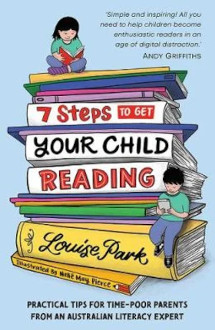7 steps to get your child reading by Louise Park

Illus. by Nene May Pierce. Allen & Unwin, 2020. ISBN:
9781760524678. 256pp., pbk.
As the new school year approaches there is great excitement for new
students as well as their parents as one of the biggest milestones
in their lives approaches. And for the little ones, no matter what
else is promised, it is the prospect of learning to read that is
predominant. So much so, that for many there is great disappointment
because they don't achieve that goal on the first day!
After almost 50 years of teaching our youngest readers to master
that mysterious code of squiggles on the page, I know that it is
imperative to have them able to begin their journey in both the
classroom and the library from that very first day. But there is
much that can be done at home in preparation for that more formal
instruction and this book from author and education consultant
Louise Park outlines a series of steps that parents can implement
long before the classroom doors open.
While there are many books written by many people who have
experience in the literacy field from all of its diverse angles,
this one focuses on the children of the tech generation where there
is so much competition from screens. It combines the traditional
thinking while embracing technology so that the two are not mutually
exclusive. The seven steps are:
Step 1: Talking their way to literacy
Step 2: Reading their way to literacy
Step 3: Linking writing and reading
Step 4: Taming the tech and making it count
Step 5: Harnessing the power of book ownership
Step 6: Embracing two reading philosophies
Step 7: Finding just-right books for any age
Difficulty learning to read, write and spell
Each is set out in an appealing format with language that parents
will readily understand - it's not full of the eduspeak that so many
teachers favour - yet treats them as intelligent human beings. It
clearly explains what the brain is doing when we read and that there
is no one-size-fits-all magic bullet simple because every child's
experiences and circumstances are different.
That 50 years of working with little ones and their parents has also
taught me that when it comes to reports and interviews, it is the
child's literacy development that parents are most interested in
because they know that that is the key that unlocks all the other
doors. But I also know that reading begins long before a child comes
to school, that success is a partnership between parent and
professional and so providing books like this either informally or
formally as part of a parent participation program can help them
enormously. As the professionals we have the responsibility to do
whatever it takes to ensure the children in our care explore and
explode their potential so helping their parents help them is an
essential foundation.
Barbara Braxton